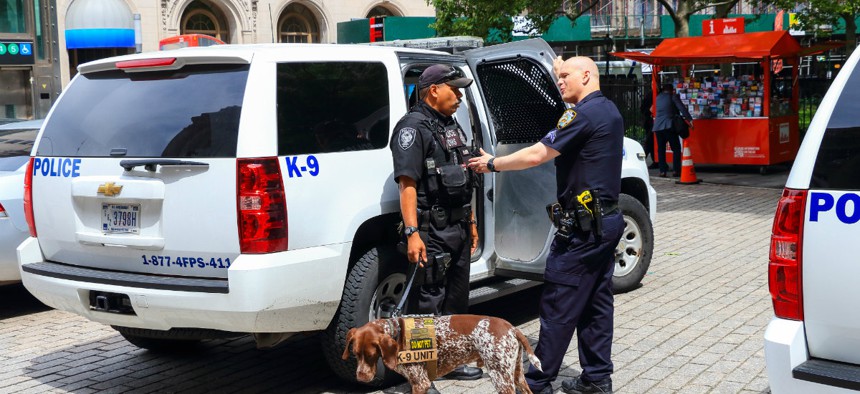Connecting state and local government leaders
A new report fleshes out the controversial demand to cut police department budgets and reallocate those funds into healthcare, housing, jobs, and schools. Will that make communities of color safer?
One of the most contested planks of the Black Lives Matter movement’s platform is the idea of divesting from police departments. This is the demand that government agencies divert funds from law enforcement and put those resources into programs that communities, particularly black and Latino, actually want, like affordable housing.
It’s controversial because anything that tends to pit black lives versus so-called blue lives in the political landscape these days invites outrage from the right like few other issues. But so far, the divestment debate has been short on practical details about what, precisely, such an initiative would look like. A new report produced on behalf of a coalition of national and local racial justice groups, “Freedom to Thrive: Reimagining Safety and Security in Our Communities,” fleshes out the idea.
“These invest/divest campaigns, which advocate for investments in supportive services and divestment from punitive institutions, challenge the very roots of mass criminalization and inequity,” reads the report. “They demand elected officials and decision makers acknowledge that the lack of investment in communities of color and the over-investment in their criminalization is emblematic of governmental disregard for Black and brown life.”
The report is less concerned with scrutinizing elected officials, though, and more focused on involving communities in their local government budgetary processes. It spends a few pages breaking down the various components of city and county budgets before laying out its case for how jurisdictions can better allocate resources.
“This report is groundbreaking because we often talk about black and brown communities, and particularly low-income communities as having no investments, no resources, and being starved,” says Jennifer Epps-Addison, co-executive director of the Center for Popular Democracy. “What our report shows is that, in fact, there is an incredible amount of investment going into black and brown communities. But it’s going into criminalizing them.”
That kind of financing of criminalization exists in most of the twelve cities and counties profiled in the report. In each profile, government budgets are dissected to show the percentage of funds committed to police/prison-related costs compared to “expenditures on the resources and services that truly keep communities safe—health and mental health, education, youth development, workforce development, and public transportation.”
In Atlanta, for example, roughly 13 percent of the city’s operating budget ($251.7 million) is for the police and corrections departments while only 3 percent ($59.9 million) goes to the departments of community development and parks and recreation, which handle transit, affordable housing, and after-school programs. In Chicago, 17.6 percent of its operating budget, or roughly $1.5 billion, goes to the police, as opposed to a collective 5.4 percent ($450 million) going to the departments of planning and development (which handles affordable housing), public health, family and support services, and transportation.
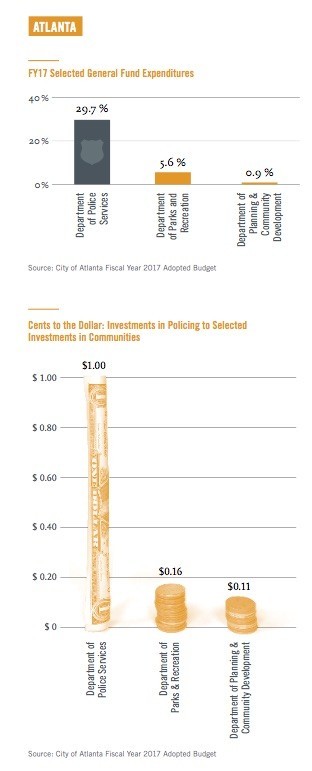
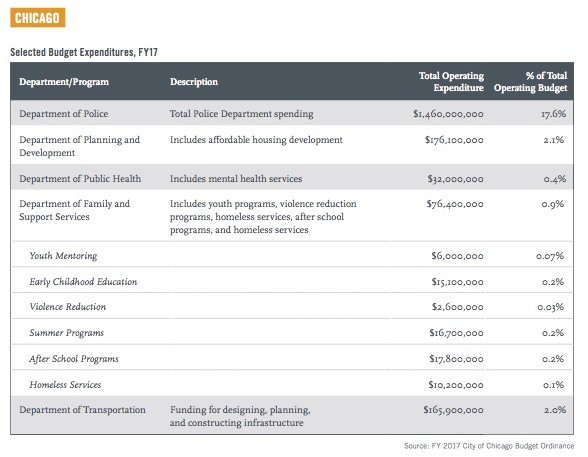
At the root of the report is a call to redefine community safety. The Center for Popular Democracy, Law for Black Lives, and Black Youth Project 100 worked with 27 grassroots and community-based organizations across the country to produce the 100-page document. Group members surveyed people in their communities—many of which are among those most beset by violence and over-policing—asking them to imagine what a truly free and safe neighborhood would look like. They found, unsurprisingly, that safety for these communities does not involve being regularly surveilled and monitored, but rather having better access to things like counseling for trauma and addiction. Community members said they felt safer with programs that help people overcome life’s challenges and coping with the stigmas that come with them.
There’s a large body of research on crime reduction that agrees with them:
- A 2016 report from the Sentencing Project found that incarceration accounted for maybe 25 percent of the drop in crime since the 1990s. Meanwhile, research “demonstrates that investments in drug treatment, interventions with at-risk families, and school completion programs are more cost-effective than expanded incarceration as crime control measures,” reads the report.
- A report from the (Obama) White House’s Council of Economic Advisers last year found that “a 10 percent increase in wages for non-college educated men results in approximately a 10 to 20 percent reduction in crime rates.”
- On June 19, public health experts of the Pew Charitable Trust’s Public Safety Performance Project penned a letter stating that “there is no statistically significant relationship between state drug offender imprisonment rates and three measures of state drug problems: rates of illicit drug use, drug overdose deaths, and drug arrests.”
These are the kinds of solutions that the “Freedom to Thrive” report asks cities to re-proportion their budgets toward. And some cities have started doing this, with varying degrees of success. For example, this past December, in Minneapolis, Neighborhoods Organizing for Change successfully urged the city to divert roughly $1.5 million towards “safety beyond policing strategies” implemented by the city’s health department and by community-based organizations. However, Minneapolis also hired 15 additional police officers out of that same budget, to the tune of about $4 million. As the city’s OpenGov charts show below, the amount the city spends on law enforcement dwarfs what it spends on health and this has been the case since at least 2008:
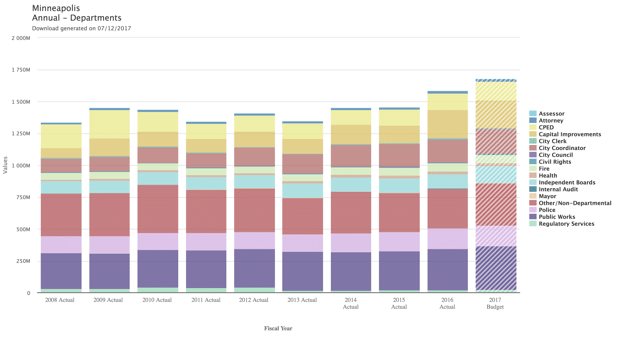
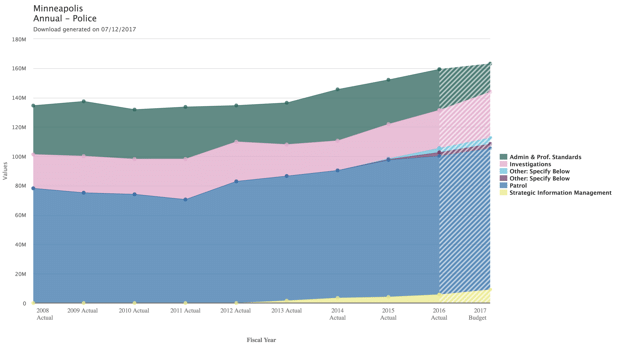
But if these cities flipped the script and spent a third of their funds on things like clinics, job trainings, and housing, would black and Latino residents really be safer?
Sure, perhaps with healthier and more financially well-off residents, violent crime would drop in these communities. But what about the neighborhood insecurity that comes from reckless and racist policing—the problem that spurred the divest/invest proposal to begin with? Knowing that some police officers target African Americans and Latinos regardless of their wealth or station in life, I wasn’t totally convinced:
- In Baltimore, Justice Department investigators found that police excessively stopped African Americans in their cars in all nine city police districts, regardless of the racial and economic demographics of each district.
- Chicago Mayor Rahm Emanuel’s task force on police reform reported back that complaints of police racism across the city “came from a significant cross-section of people: men and women, young, middle-aged and older, doctors, lawyers, teachers and other professionals, students, and everyday workers. Regardless of the demographic, people of color loudly expressed their outrage about how they are treated by the police.”
- Philando Castile, who was murdered by police near St. Paul, Minnesota, had dozens of traffic violations on his record, but nothing violent or felonious. If anything, his nearly-50 traffic arrests were the result of racial profiling, not because he lacked a job or housing.
- Just on Monday, Florida’s only African-American state attorney, Aramis Ayala, was pulled over by police for apparently no reason, in what appears to be a racial profiling incident.
Meaning: Regardless of social standing or educational background, people of color still get stopped, frisked, questioned, searched, beaten, disrespected, and killed by police.
More than just censure, police need accountability, which means investing in things like training, counseling, monitoring, new computer systems, and new equipment, like body cameras and non-lethal weapons. These are the kinds of things called for in consent decrees between the Justice Department and problematic police departments anyway, but they must be paid for, and they’re expensive. Such costs are why Ferguson’s city council tried to wiggle out of its consent decree with the Justice Department, as New Orleans also once tried.
These are also the kinds of things that would probably be the first casualties of police divestment. Would a defunded police department, with fewer officers and resources, be less racist? Or would police act even more obnoxiously, and oppressively, but with less mechanisms for accountability in place?
“One of the ways to help curb the deep-seated state violence perpetuated from within police forces is to ensure that the resources that they are getting are directed to solving the most violent crimes,” says Epps-Addison, who once served as a public defender in Milwaukee. “When we get more police, what we’re seeing is an increase in broken-windows policing, where police are surveilling poverty and not actual crimes. We’re seeing checkpoints where police are surveilling undocumented folks who are just going about their daily business. That doesn’t lead to safer communities.”
Janaé Bonsu, the National Policy Chair for Black Youth Project 100 (one of the organizations represented in the report), notes that things like body cameras and Tasers have only given police “the appearance of legitimacy” anyway. “Just taking body cameras for example, that’s been one of the go-to solutions for police accountability over the past few years,” says Bonsu, “but you’d be hard pressed to find instances where body camera footage, or even camera footage in general, has actually resulted in police accountability.”
Indeed, police killings such as Alton Sterling in Baton Rouge and Castile in Minnesota were both captured by civilian and police cams, and yet officers were acquitted in both cases. However, as controversial and unsettling as police cam policy is, there are existing cases of camera footage used to bring police to justice. Moreover, camera recordings work in other ways that bring value to the police accountability discussion.
Case in point: A group of Stanford University researchers used body camera footage to release this report earlier this year showing that police treat and speak to African-American drivers far more disrespectfully during traffic stops than when dealing with white drivers. This held true for a variety of geographic areas, showing that “neither the crime rate nor density of businesses in the area of the stop were significant.” The researchers noted the “power of body camera footage as an important source of data, not just as evidence, addressing limitations with methodologies that rely on citizens’ recollection of past interactions or direct researcher observation of police behavior.”
***
I get it, though. I personally, as an African American, don’t want to finance the roughing up, patting down, and locking up of other African Americans through my tax dollars. In theory, the invest/divest strategy seems completely sane, while the idea of rewarding police forces that exhibit patterns and practices of unconstitutional law enforcement with more funding seems insane. And yet, that’s exactly what the Justice Department does for police departments involved in killing African Americans.
However, assuming the police will continue to exist in my lifetime, I’m concerned about what might fill the void if we did start shrinking them out of existence, as some activists have called for. Harold Pollack, a public health professor and co-director of the University of Chicago Crime Lab, has similar reservations.
“I think people have a very valid grievance—there is a tremendous imbalance between the criminal justice response and the everything-else response to the problems of low-income minority communities, and people are completely justified in noting that imbalance,” says Pollack. “However, divesting police resources I think is ill-advised on the merits and on the politics of urban America. Divestment would in fact lead to more bad policing and less good policing, and it also sets up a dynamic that plays right into the hands of people who do not wish these communities well. If I were Donald Trump and Jeff Sessions and I wanted to come up with a way of demonizing Black Lives Matter, and demonizing people concerned about police abuses, and polarizing the debate about urban law enforcement, this would be a great issue for me.”
To be fair, the groups behind the “Freedom to Thrive” report are challenging people to think about what it means to be free and safe in ways unburdened by the present political realities. They asked the communities that are most affected by police and violence to determine what neighborhood security means on their own terms, and this is a worthy enterprise.
I worry, though, that more affluent neighborhoods and business districts are also envisioning “safety” on their own terms. Many of them are investing in their own private security forces—some out of a belief that current police services are inadequate. These private police are on the rise, are armed, and are even less accountable to the public than traditional police. The last thing communities of color need right now are a bunch of deputized George Zimmermans running around.
Epps-Addison, however, dismisses that concern. “Quite honestly, the communities that are considering this tactic are not the communities that are most devastated or impacted by crime,” she says. “For me, and for most folks interviewed for the report, most of them want the freedom to imagine and dream about a community that doesn't need to be monitored and surveilled and oppressed. What does it mean to be free when you have been stopped and pulled over by the police over 40 times while having committed no crimes, as what happened to Philando Castile? How do we define that as safety, when the people who are pulling you over and are authorized to do that are now the same people who have murdered you?”
For Black Youth Project 100’s Bonsu, the argument is less about depriving police of resources and more about funding other non-police institutions for tasks that probably shouldn’t be left to police to begin with. “Instead of buying a slew of new equipment or trainings for police departments, why not try a mobile crisis intervention unit to respond to 911 calls for mental health crises—especially when there are professions that are already doing that work?” she says.
This is not unreasonable—many police leaders have been saying that they’re being left responsible to take care of too many of society’s failings.
“We want the same type of policing that white folks get,” says Epps-Addison. “When there’s a mental health crisis, we want for the police to not be the first responder in black communities, because it's rare that they are the first responder in white communities, and they’re certainly rarely the first responder in affluent communities.”
There are, no doubt, many things that deserve divestment within police departments: For instance, the kind of Call of Duty tanks and weaponry police displayed during the Ferguson riots do nothing to inspire community trust. However, pitting police budgets against the budgets of health departments and schools might not always be the best strategy. (See season four of “The Wire” for a glance at how that battle ends.)
If the issue is health crisis response, though, Pollack questions why law enforcement budgets are targeted: There are bigger pots of money to go after. “Why not go to police departments in every city and tell them to speak up for Medicaid expansion?” he asks. “That is absolutely where all the resources are going to come from for the [mental health] treatment and outreach resources—it brings in far more money than you could ever get out of the law enforcement budget. We could divest 99 percent of a city’s police budget, but then if this Senate healthcare bill passes—the police will be the first responders for a lot of mental health problems, because there will be no other resources available.”
So perhaps to divest or not to divest from the police isn’t the only question. The way cities throw land away tax-free for professional sports stadiums and shopping districts alone takes funding from communities that need more resources. Legalizing marijuana is one way to get the police off of communities’ backs while providing a new revenue stream for schools, healthcare, and jobs, as well. But then again, legalizing weed is still considered a far-fetched idea to many, as was legalizing alcohol before it—an important thing to remember before casting off the merits of police divestiture.
“People may want to call this report radical and abolitionist, but really it is a practical report based on best practices and research on what actually helps communities succeed and what helps reduce crime,” says Epps-Addison. “That's all we’re asking people to dive into.”
Brentin Mock is a staff writer at CityLab, where this article was originally published as part of “The Presence of Justice,” a project which is supported by a grant from the John D. and Catherine T. MacArthur Foundation’s Safety and Justice Challenge.

NEXT STORY: A County Official on the Front Lines of the Opioid Crisis Makes His Case on Capitol Hill
